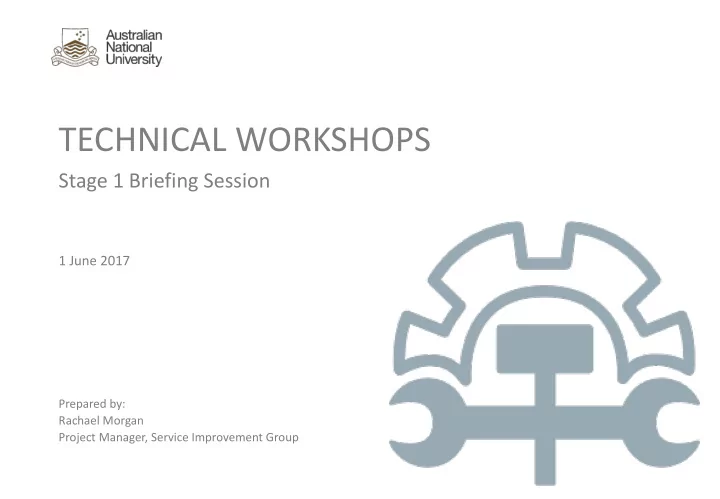

TECHNICAL WORKSHOPS Stage 1 Briefing Session 1 June 2017 Prepared by: Rachael Morgan Project Manager, Service Improvement Group
PROJECT BACKGROUND WHAT ARE THE WORKSHOPS? • Multiple Research Schools at ANU operate independent technical workshops. • Collaborate with researchers on the conceptualisation, design and build of novel research equipment that is not available commercially to support cutting edge and experimental research. • This is often an iterative process that is reliant on the knowledge and expertise of technical workshop technicians. • Also undertake maintenance on research and teaching laboratory equipment. • A key concern of the current model is the future sustainability of the technical workshops and the ability of some Research Schools to continue providing support for their workshops. 2
PROJECT BACKGROUND WHY THIS PROJECT? • Discussions with other Group of Eight Universities indicated that many had, or were in the process of, updating their technical workshops. • Uniforum data indicated that the ANU had a fragmented workshops workforce. • Research Schools continue to operate under financial constraints and are struggling to maintain their technical workforce. • The University conducted an analysis to explore the services provided by our workshops and how we can keep them viable into the future. 3
PROJECT BACKGROUND HOW DID WE GET HERE? • A concept paper exploring the current problems with technical workshops at the ANU was presented to the Service Improvement Steering Committee (SISC) in November 2015. Approval was granted to undertake a more in-depth analysis of the technical workshops at the University. • From November 2016 to March 2017 a review of the technical workshops was undertaken by the Service Improvement Group (SIG). • The data collected contributed to development of a Business Case that made recommendations for improvements and was approved by the SISC on 22 March 2017. 4
FINDINGS 5
FINDINGS CURRENT FUTURE • Current systems are inconsistent between • A single work management system used by 1. WORK Research Schools in what data is captured technical workshops to initiate, manage and MANAGEMENT • No reliable data sources track and invoice workshop services • No defined set of services • A thorough catalogue of what services are and 2. SERVICES & • Variable levels of knowledge and expertise are not available from all the technical DELIVERY • Varying service delivery workshops at the University • Different levels of subsidisation between • A funding and cost recovery model that is Research Schools 3. FUNDING equitable and accessible for all users of the • Researchers without a local technical workshop MODEL technical workshop services are disadvantaged • Depth of both skills and knowledge, but it is • A unified workforce with the right skills and siloed between workshops capacity to deliver services 4. WORKFORCE • No formal knowledge sharing or training • Career path and skills development including a • No workload sharing apprentice scheme with Indigenous Australians • Inefficient duplication of equipment and spaces • Optimised footprint and equipment needs 5. DUPLICATION • Specialised equipment is siloed in workshops through at least partial consolidation 6
PROJECT STAGES • Establish standardised processes and data reporting requirements • Collect data on time effort by job, services and activities, and customer • Use data to inform service catalogue and a funding and costing model STAGE 2: STAGE 3: STAGE 1: SERVICES CATALOGUE & WORKFORCE UNIFICATION & WORK MANAGEMENT SYSTEM STANDARDISED OPERATING PHYSICAL CONSOLIDATION AND FUNDING MODEL • Examine how changes to the operating model changed how the researchers use the workshop • Develop a workforce strategy that meets the needs of the researchers • Devise and implement a consolidated footprint, using data and consultation 7
STAGE 1 TIMELINE & ACTIVITIES 8
PROJECT SCOPE WHAT WORKSHOP SERVICES ARE INCLUDED IN PHASE 1 OF THE PROJECT? • Design services (including idea and feasibility testing) • Fabrication services • Maintenance and repair of research and teaching laboratory equipment 9
PROJECT SCOPE WHAT WORKSHOP SERVICES ARE NOT INCLUDED IN PHASE 1 OF THE PROJECT? • Building maintenance services • Operation of research equipment • Workshop equipment used for teaching and learning 10
NEXT STEPS WHAT WE WILL DO NEXT? • We will be in contact with the workshops and their managers to arrange meetings to discuss current workshop processes • Launch a project site that will be regularly updated with information and documentation about the project • Distribute this presentation and a summary of the questions asked and their answers CONTACT DETAILS • Rachael Morgan – Project Manager (Service Improvement Group) Rachael.Morgan@anu.edu.au Ex. 59650 11
Recommend
More recommend